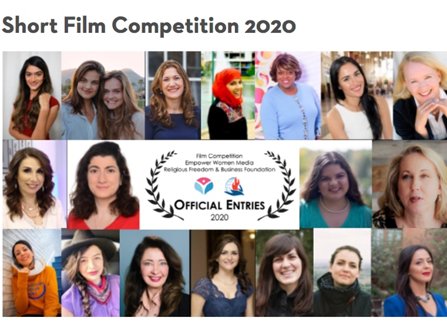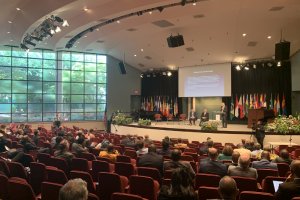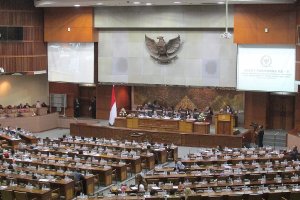
An Afghan immigrant who helps refugee youth in the United States overcome obstacles to their success through a soccer-based mentoring program has won a top prize in the third annual Religious Freedom & Business Film Competition, which showcases the work of women filmmakers whose lives demonstrate multifaith collaboration in the workplace, marketplace and society.
Mariya Dostzadah Goodbrake, founding director of Global FC (Futbol Community), a sports-based nonprofit based in Kansas City, Missouri, won the grand prize in the competition’s live short film category for her film Long Road to Freedom.
The prize was one of the top honors announced July 10 by the Religious Freedom & Business Foundation and its cosponsor, Empower Women Media. The Foundation is a Washington, D.C.-based nonprofit whose apolitical mission is to educate “the global business community, policymakers, nongovernment organizations and consumers about the positive power faith—and religious freedom for all—has on business and the economy.” Empower Women Media is a Los Angeles-based networking, training, mentoring and collaborative forum whose purpose is to help women become world-class leaders by creating media for their missions.
Long Road to Freedom is the story of Mariya Dostzadah Goodbrake, who immigrated from strife-torn Afghanistan under Soviet occupation. She moved to Canada, and eventually the U.S., where her struggles to adapt culturally inspired her to launch a nonprofit mentoring program that uses soccer as a vehicle to help young, displaced refugees from around the world to thrive. The sport helps young people bridge diverse religious beliefs and ways of life, enabling them to form authentic, lasting relationships.
The grand prize in the animation category was awarded to Maral Karaee, an Iranian immigrant to Canada, for her film District 18, based on Article 18 of the Universal Declaration of Human Rights: that every person has the right to freedom of thought, conscience and religion. The film’s main character, a young woman, finds these values in a foreign land after fleeing the society she has been born into—a place that repudiates cultural and religious diversity.
All winning and finalist films are “artful and compelling explorations of the impact of freedom of religion and belief (FoRB) in the workplace and community,” the competition’s cosponsors note. “Whether inspired by real-life events or fictional stories, animated, or experimental, the films thoroughly seek to affirm that FoRB is good for business and thriving communities.”
Finalists for this year’s film competition hail from 10 countries—Afghanistan, Canada, India, Iran, Jordan, Hungary, Lebanon, Tunisia, United Arab Emirates and the United States. They include Ruba Abbassi and Hiba Eid, two Jordanians who created Her Factor, a film that advocates empowerment of women in the Middle East. Together as One, by Afghan filmmaker Sarina Faizy, is a story of freedom of belief under the Taliban. And Freedom to Succeed, by Lydia Sunberg (Hungary) and Sage Taber (U.S.), argues for the need to give immigrants and refugees the freedom to contribute to the economies of their adopted homeland.
The winners were selected by a panel of 17 judges based on the films’ storytelling excellence and advocacy impact. The panel included Azza Karam, Professor of Religion and Development at Vrije Universiteit in Amsterdam and President of Religions for Peace, an international multireligious organization founded in 1970.
Also on the panel was Robert A. Seiple, the first Ambassador at Large for International Religious Freedom, the official who heads the U.S. Commission on International Religious Freedom, a bipartisan federal body within the State Department that monitors issues surrounding religious liberty worldwide.
Competition sponsors hosted a film festival and award ceremony online August 1 to honor and celebrate the winning films. The Religious Freedom & Business Foundation has awarded each grand prize winner $5,000 plus a trip to Tokyo to present their short films at the 2021 Paralympic Games.
“In an age when there is an urgent need for inclusion and appreciation of diversity, this film competition has empowered new voices from around the world to contribute to the discussion,” said Brian Grim, president of the Religious Freedom & Business Foundation.
“We are passionate about empowering women to create media for their mission,” said Shirin Taber, director of Empower Women Media. “I am thrilled to see women sharing their religious freedom stories and expanding their outreach to some of the toughest places in the world.”
From its beginnings, the Church of Scientology has recognized that freedom of religion is a fundamental human right. In a world where conflicts are often traceable to intolerance of others’ religious beliefs and practices, the Church has, for more than 50 years, made the preservation of religious liberty an overriding concern.
The Church publishes this blog to help create a better understanding of the freedom of religion and belief and provide news on religious freedom and issues affecting this freedom around the world.
For more information, visit the Scientology website or Scientology Network.


